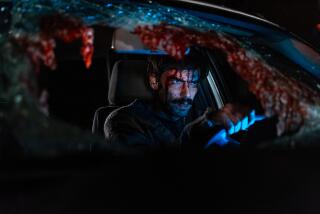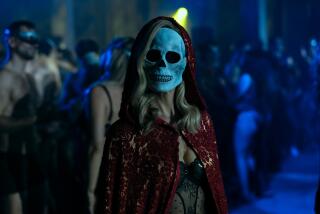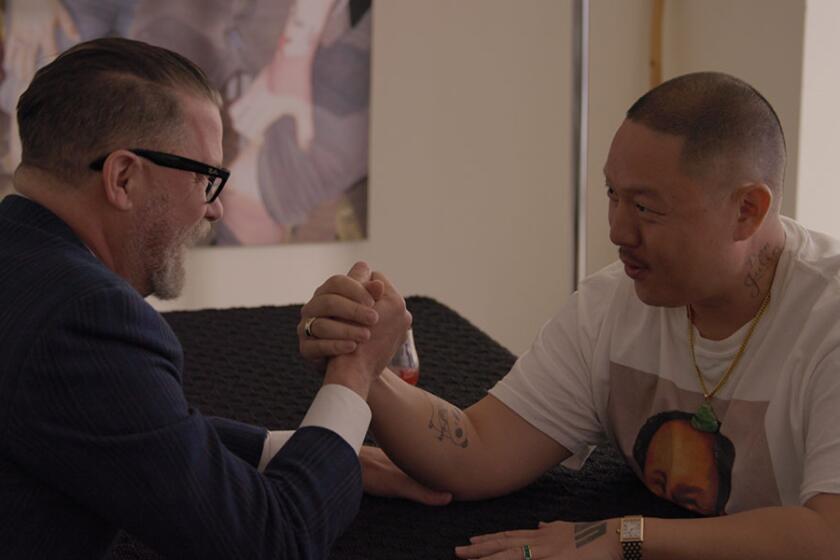Review: James Wan’s touch makes ‘The Conjuring 2’ a worthy, shivery sequel
Set in a gloomy North London council house in 1977, “The Conjuring 2” is a work of British kitchen-sink realism in the guise of a supernatural thriller: Call it Ken Loach’s “Poltergeist,” or perhaps “The Exorcist” as imagined by a young Mike Leigh. The actual director is James Wan, who has followed up his superb “The Conjuring” (2013) with another virtuosic exercise in mobile camerawork and moldering production design, tethered to a story that handles its characters and their working-class milieu with an unexpectedly grounded, sensitive touch. Generous with jolts but devoid of gratuitous bloodshed, these are the rare horror movies that seem more interested in how people live than how they die.
The sequel picks up several years after the events of “The Conjuring,” which introduced us to Ed and Lorraine Warren (played by Patrick Wilson and Vera Farmiga), a real-life married couple who devoted their lives to investigating the paranormal, most famously the Amityville Horror in 1976. Chillingly re-enacted here in a prologue worthy of “In Cold Blood,” that notorious case took a terrible toll on the Warrens, and has left Lorraine especially reluctant to leave their New England home to chase yet another haunting. History and Hollywood, alas, have left them little choice.
Loosely based on a series of wall-rattling, furniture-throwing and thoroughly hair-raising events that gripped the London borough of Enfield in the late ’70s, “The Conjuring 2” takes its time flying the Warrens across the Atlantic. (A bit too much time, given the film’s generous 134-minute length.) The Enfield demon likes to get to know its victims: first Janet Hodgson (Madison Wolfe), an impressionable 13-year-old whom we first see fiddling with a homemade spirit board, and then her three siblings, and eventually their single mother, Peggy (the excellent Frances O’Connor), who’s already at her wits’ end trying to keep food on the table.
The terrors that befall this struggling family are nothing you haven’t seen before: chairs that rock of their own accord, a TV that suddenly switches channels (never more scarily than when it lands on Margaret Thatcher), guttural voices and possessed toys and doors that go bump in the night. But Wan has a gift for investing even the creakiest cliches with shivery élan. He has always been a versatile connoisseur of genre thrills (his credits include “Furious 7,” the original “Saw” and the two “Insidious” movies), but there is something about the Warrens’ case files that pushes his filmmaking into the realm of the rhapsodic.
Evincing a patience and mastery of mise-en-scène increasingly rare in mainstream horror cinema, Wan isn’t above resorting to a good, cheap shock, and he has one bogeywoman up his sleeve so frighteningly effective — let’s just call her, literally, the nun from hell — that even the movie can’t stifle a nervous giggle. But Wan’s real talent is for modulation, for elongated sequences that build and build with breathless intensity. Working with the cinematographer Don Burgess, he sends the camera hurtling in and out of rooms, up and down hallways, and at one point right through the floor so that it comes out on the other side, pressed up against the ceiling: The freer the sense of movement, the more harrowing the sense of no escape.
There’s real feeling beneath all that technique. What keeps “The Conjuring 2” from coming across as just another retread is its sympathetic understanding of how trapped the Hodgsons are — not just by the ghoulish entity that has taken over their flat (or perhaps it never went away), but also by the more mundane forces of poverty, isolation and despair. Things aren’t magically solved once the Warrens finally show up; on the contrary, their arrival prompts a dangerous shift in the demon’s strategy. But one of their most telling and applicable insights is that evil feeds — and thrives — on everyday human anxiety.
Pointedly, it also thrives on the efforts of a professional skeptic (Franka Potente, too long absent from the big screen) who is determined to expose the Hodgsons’ ordeal as a massive hoax. The Warrens, for their part, are somewhat straitjacketed by the rigor of their methods. (Ed died in 2006; Lorraine, now retired, served as a consultant on both “Conjuring” films.) As representatives of the Catholic Church, they must find decisive proof of paranormal activity before taking action, and Wan (one of four credited screenwriters) has diabolical fun poring over the evidence, assembling the Warrens’ case and then dismantling it all over again.
Much like its predecessor, then, “The Conjuring 2” is a faith-based freakout at heart: It ruthlessly exploits the spectacle of demonic possession, treats disbelief as a dangerous enemy, and finds a vital antidote in the warm embrace of a loving, God-fearing family. Depending on their persuasion, some audiences may find this an off-puttingly conservative stance, which is why the focus on the Warrens is such a masterstroke: It would take a more agnostic critic than this one not to be disarmed by their evangelical-Nick-and-Nora routine.
It’s hard to resist Wilson’s goofily square charm (look out for the world’s most incongruous Elvis impersonation), let alone the extraordinary commingling of fear, kindness and conviction in Farmiga’s otherworldly gaze. Wan is shrewd enough to recognize that the appeal of his characters goes beyond their specific ideology. In horror movies, as in matters of the soul, a little decency goes a long way.
------------
‘The Conjuring 2’
MPAA rating: R for terror and horror violence
Running time: 2 hours, 14 minutes
Playing: In wide release
More to Read
Only good movies
Get the Indie Focus newsletter, Mark Olsen's weekly guide to the world of cinema.
You may occasionally receive promotional content from the Los Angeles Times.









